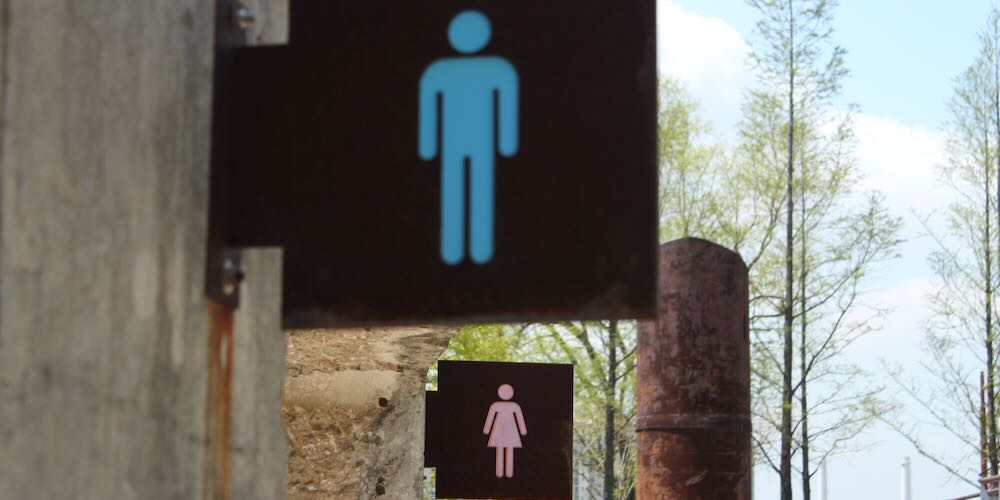How can we explain modern academics' willingness to trudge through the clotted prose and intellectual frivolity of gender theory?
Shouting Your Pronouns in a Crowded Theater
We are just coming off another summer of Pride here in the US, so let’s try out a thought experiment to assess where we are as a society. Imagine yourself in a crowded room with few exits. Everyone is chatting amicably when someone yells, “Fire!” What happens?
My guess is you expected people to start fleeing the room, or some other appropriate response to a fire. But let me ask the question slightly differently. When someone yells, “Fire!” what happens linguistically?
According to philosopher J. L. Austin’s speech-act theory in his influential book How to Do Things with Words, there are at least three things that happen in such a scenario: locution, illocution, and perlocution. In locution, there is a simple transfer of information: a fire is present. In illocution, the exclamation had some effect on the speaker: perhaps he or she became a hero in his or her own mind and began helping others to safety. In perlocution, some effect occurred in the minds of the listeners: they may have fled in terror or rushed to assist others. The exclamation of “Fire!” changed the status quo dramatically.
Now, let us briefly alter our thought experiment. Imagine that you as a listener learned that the person who yelled “Fire!” was mistaken. Would it be right to flee in terror? Would it be right to help others flee? Of course not. There was no fire present.
Why would anyone yell “Fire!” when there was no fire? Actually, there are many possible reasons. Perhaps the person was simply confused, thinking that there was a fire. After all, fires do occur in buildings, and people need to be informed for their own well-being. Better safe than sorry, they might say. Or maybe the person was not confused at all. Maybe the person knew all along that he or she was lying and had nefarious intentions. In the speech-act of yelling “Fire!” many things can occur, regardless of the accuracy of the data.
Now to the matter at hand. If we swap out the exclamation of “Fire!” with someone’s personal pronouns of choice, we can start to see what happens. According to Austin’s theory of speech acts, more than just data transfer occurs in spoken words. The hearer is changed. Thus, the communication of one’s preferred pronouns does more than just transfer data. The speaker is attempting to change something about the listener: beliefs, actions, feelings, etc. This is how pronouns become perlocution. Pronouns are not just communicating the preferred gender of the speaker. They are supposed to change the audience.
The trans community has made a very concerted effort at changing how non-trans people think about them. They utilize this heretofore unsung part of speech to shape the actions and beliefs of those outside the trans community. (Fair enough. It’s a very human thing to want people to think accurately [or better] of you.) Trans people often display their pronouns of choice on nametags, uniforms, social media profiles, and other platforms, and any failure (intentional or not) on the part of others to use the displayed pronouns can result in confrontation. In turn, the avoidance of such confrontations, no doubt, leads to general acceptance of the chosen pronouns and the purported identity. That’s perlocution.
Instead of changing people’s hearts and minds, pronoun perlocution has caused the unexpected: laughter and fear.
Some people accept the pronoun claims as true and act accordingly. Others, however, refuse to comply because they believe they are being pressured into saying something untrue. The result is confrontation, and we can see the conflicts playing out in various social contexts. Workplaces are requiring training in diversity that includes pronoun instruction. Such training is supposed to ensure that coworkers accept and affirm trans people. This is perlocution in the real world.
This is happening on college campuses, too. From trans students’ perspectives, a refusal to use preferred pronouns makes people feel disrespected and unsafe. The universal acceptance of preferred pronouns will change the attitudes, views, and behavior of those outside their community. That presumption of perlocution makes them feel accepted, affirmed, valued, and safe.
Even state governments are involved in the endeavor. Michigan’s House of Representatives recently passed a bill that criminalizes the failure to use someone’s preferred pronouns. Anyone convicted of this felony would face imprisonment up to 5 years and a fine up to $10,000. The bill is waiting for approval in the State senate.
Clearly, the stakes are high for those resisting the pronoun-as-perlocution agenda.
However, here’s the rub: the trans community has offered no compelling logic for their claims regarding their genders. They simply say this is how they feel about the situation. In many areas of life, this would not be a problem. Generally speaking, a free society should not care about feelings. However, the trans community has pressed the issue into society-altering actions: bathroom usage, prison assignments, tax money for healthcare, etc. Again, this is yelling “Fire!” when someone feels like there’s a fire, even though that person might be unsure, unsettled, or even unethical. As such, the non-trans community is under no obligation to accommodate their requests, despite the moral pressure from the trans community to do so.
Why? There are many reasons but I’ll just give two. First, pronouns will never sufficiently perlocute one’s chosen gender because they cannot illocute one’s chosen gender either. In other words, even as part of a multi-pronged strategy of hormones, clothing, surgery, and make-up, pronouns will come up short in affirming one’s personal choice. All of these things merely reveal personal choice. And this is the heart of the issue. Personal choice—while a luxury—is impotent against the juggernaut of natural forces. One might choose to fly off a skyscraper, but gravity has a stronger say in the success of that flight. One might choose pronouns that do not correspond to nature’s allocation of gender, but they are, in the final analysis, impotent to change nature. And if they cannot change the gender of an individual, then they should not be utilized to change other people’s minds either. Indeed, a part of speech was never intended to carry that weight.
In any event, this perlocution endeavor won’t work. The acceptable pronoun formula (He/Him, She/Her, etc.) has already been coopted by comedians, internet memes, satirists, and even the trans community itself. In other words, the sacred formula of pronoun communications has already become better at accomplishing other things than the thing for which it was created. Two examples will suffice.
First, billionaire entrepreneur Elon Musk recently came out against former NIH Director, Anthony Fauci, and his handling of various Covid-era policies. In a tweet, Musk introduced himself and said his pronouns are “Prosecute/Fauci.” The sacred (pronoun choice) has become profane (comedic) because people realize the impotence of pronoun choice.
Second, take recent signage hung prominently in New York City’s train stations. Underneath a pride flag are instructions against bigotry, hatred, or prejudice. And underneath those instructions is a draconian warning: If you don’t respect trans people, your pronouns will be “was/were.” Through a thinly veiled threat, one can see that the sacred has now become threatening. Instead of changing people’s hearts and minds, pronoun perlocution has caused the unexpected: laughter and fear.
Perlocution depends upon a social contract that is built on trust, and the ethical terms are generally—but tacitly—agreed upon in a free society. I trust you to yell “fire” only when there is one, and vice versa. If you do not abide by this trust, you maintain your right to yell “fire,” but I am under no obligation to listen to you. In the case of pronouns, I trust you to use pronouns that correspond to objective reality, not what your personal imagination tells you. For the trans community, there has been an agreed-upon objective basis for determining someone’s gender. And someone’s personal imagination—while perhaps enjoyable for that person—has no moral or practical bearing on how a society views that person.
All of this points to the need for an absolute, which Nature and Nature’s God have given us: biological sex, male and female. This binary that has functioned extraordinarily well for millennia needs to be given primacy in our society once again. Human endeavors—surgeries, clothing, pharmaceuticals, etc.—to undo what is revealed in nature have not been able to produce what they hoped for, namely, changes of genders. Indeed, because of the failures of the above, the trans community has become militant regarding pronouns, hoping that perlocution finishes the job.
Rather, we should follow what natural law has always shown us. Human beings are made to be male and female, man and woman, and they function best when functioning inside that paradigm. Ironically, many of the people who religiously follow nature in other areas (evolution, racial justice, climate change, etc.), suddenly find themselves at war with the healthy human body.
Furthermore, this male/female binary allows for a broad spectrum of masculinity and femininity. Masculine does not necessarily mean machismo, nor does feminine necessarily mean effeminate. Natural law allows for a range of gender expressions within the binary of male and female, so the attempt to generate genders at whim is as arbitrary as the moral demands to use someone’s preferred pronouns.
Finding other solutions besides this binary would require an upending of nature that goes beyond gender. It requires that nature no longer be viewed as reliable for anything at all. Thus, we would end up in nihilism, a destination that requires power beyond pronouns as perlocution. It would require violence. And we are already there.



